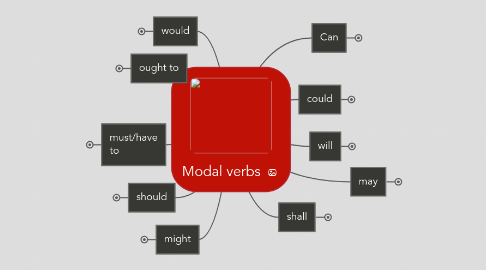
1. might
1.1. possibilities in the present or the future. In these cases, it is synonymous with "may" .
1.1.1. Example: It might be better to finish this now, rather than wait until tomorrow
1.2. It can also be used as "may" , to ask permission or make polite requests , although this use is much more common in the UK than in the United States.
2. should
2.1. "Should " indicates an obligation or recommendation. It reflects an opinion on what is right . It translates as the conditional "should" in Spanish .
2.1.1. Example: You shouldn’t work so hard
2.2. "It should " is used in interrogative sentences to ask if there is an obligation or to ask for a recommendation .
2.2.1. Example 1: Should we leave a tip?
2.2.2. Example 2: Where should they meet you?
3. ought to
3.1. " Ought to " is synonymous with "should" .
3.1.1. Example: She ought to quit smoking
3.2. Note : Never "ought to " is used in interrogative sentences in American English .
4. must/have to
4.1. "Must" indicates an obligation, prohibition or need. You can also use "have to" (have to) .
4.1.1. Example 1: You must [have to] brush your teeth two times a day.
4.1.2. Example 2: You must not drink and drive
4.1.3. Example 3: When must we meet you?
4.2. You can also use "must" to indicate probability or take something
4.2.1. Example: David not here. He must be sick because he never misses class
4.3. You may also use "must" for rhetorical questions.
4.3.1. Example: Must you always be late?
5. would
5.1. "Would" is used to declare a preference and to ask for something politely.
5.1.1. Example 1: Would you help me please?
5.1.2. Example 2: When would you like to go to the movies?
6. Can
6.1. hability or possibility
6.1.1. Example
6.2. In interrogative sentences , the use of "can" may request permission
6.2.1. Example: I can drink a glass of water ?
7. could
7.1. hability or possibility in the past
7.1.1. Example: I couldn’t sleep last night
7.2. for future possibilities
7.2.1. Example: I think it could rain later
8. may
8.1. As "could" used "may" to indicate possibilities in the future
8.1.1. Example: I would bring an umbrella, it may rain later
8.2. It can also be used to give permission or instructions
8.2.1. Example: You may use your cell phones now.
8.3. In interrogative sentences , the use of "may" is more polite than "can" or "could "
8.3.1. Example: May I leave now?
9. will
9.1. the use of "will" means will or determination.
9.1.1. Example: We will learn English
9.2. interrogative sentences information , a favor or options.
9.2.1. Example: Will you help me move?
10. shall
10.1. "Shall" is used as the "will" to form the future tense . The use of " shall" is much more common in the UK and is generally more polite.
10.1.1. Example: Ricky shall be happy to see you
10.2. You can also use "shall" for offers and suggestions or to ask about options or preferences .
10.2.1. Example 1: Shall l we meet at 10pm?
10.2.2. Example 2: Shall we go to the movies or a museum?
